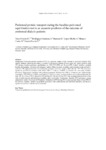Peritoneal protein transport during the baseline peritoneal equilibration test is an accurate predictor of the outcome of peritoneal dialysis patients

Ver/
Use este enlace para citar
http://hdl.handle.net/2183/19197Coleccións
- GI-FENM - Artigos [117]
- INIBIC-EENM - Artigos [52]
Metadatos
Mostrar o rexistro completo do ítemTítulo
Peritoneal protein transport during the baseline peritoneal equilibration test is an accurate predictor of the outcome of peritoneal dialysis patientsAutor(es)
Data
2010Cita bibliográfica
Pérez-Fontán M, Rodríguez-Carmona A, Barreda D. López-Muñiz A, Blanco-Castro N, García-Falcón T. Peritoneal protein transport during the baseline peritoneal equilibration test is an accurate predictor of the outcome of peritoneal dialysis patients. Nephron Clin Pract. 2010;116(2):104-113
Resumo
[Abstract] Background: Peritoneal protein excretion (PPE) is a potential marker of the outcome in peritoneal dialysis (PD) patients. Method: Observational study of a cohort of 269 patients starting PD in a single unit. Study variables: total PPE during a baseline peritoneal equilibration test (PET; PET-PPE) and 24-hour PPE. Control variables: essential baseline demographic, laboratory and adequacy markers. Main outcomes: mortality, cardiovascular events and risk of peritonitis. We applied univariate and multivariate strategies of survival analysis. Main Results: PET-PPE sustained a significant, yet limited correlation with 24-hour PPE (r = 0.46, p < 0.0005). At baseline, the main study variables showed an independent correlation with peritoneal transport characteristics (D/P240’ creatinine) and cardiovascular comorbidity. PET-PPE (p < 0.0005, model global χ2 59.4) was a more accurate predictor of overall mortality than 24-hour PPE (p = 0.04, χ2 50.5). Moreover, PPE during PET, but not 24-hour PPE, was an independent predictor of the risks of cardiovascular and infectious mortality, and of peritonitis. Conclusions: Baseline PPE represents a strong independent marker of survival of PD patients. Estimation of PPE during PET is more accurate than 24-hour PPE for this purpose, sustains a definite independent association with cardiovascular and infectious mortality, and shows a significant correlation with the risk of peritonitis.
Palabras chave
Peritoneal equilibration test
Protein transport
Cardiovascular diseases
Mortality
Peritonitis
Protein transport
Cardiovascular diseases
Mortality
Peritonitis
Versión do editor
ISSN
1660-2110
1660-8151
1660-8151
Ítems relacionados
Mostrando ítems relacionados por Título, autor ou materia.
-
Significado de la celularidad peritoneal basal: más allá del diagnóstico de infección peritoneal en diálisis peritoneal
García Gago, L.; Bravo González-Blas, L.; Otero Alonso, P.; López Iglesias, A.; García Enríquez, A.; Rodríguez-Carmona, Ana; García Falcón, María Teresa; Pérez-Fontán, Miguel (Elsevier, 2018) -
Implicación del desequilibrio redox en los cambios estructurales de la membrana peritoneal durante la diálisis peritoneal
Mondelo Macía, Patricia (2017)[Resumen] La diálisis peritoneal es una de las terapias utilizadas como tratamiento contra la enfermedad renal crónica (ERC). Esta técnica se caracteriza por utilizar el propio peritoneo de los pacientes como una membrana ... -
Comprehensive approach to peritoneal dialysis-related peritonitis by enteric microorganisms: comparison between single organism and polymicrobial infections
Ribera-Sánchez, Roi; Pérez-Fontán, Miguel; López-Iglesias, Antía; García-Enríquez, Alba; Rodríguez-Carmona, Ana (International Society for Pertioneal Dialysis, 2018)[Abstract] Background: Peritoneal infections of enteric origin (EntP) have been classically investigated using partial strategies, focused on particular subgroups of microorganisms. A more comprehensive approach may ...





